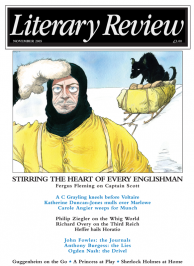Lucy Beresford
Campus Affairs
Truth and Consequences
By Alison Lurie
Chatto & Windus 232pp £15.99
There is something unsettling about an Alison Lurie novel, and Truth and Consequences is a good example. Initial impressions are of convention. There are no tricksy titles to the chapters, no postmodern self-conscious narrators, no drug-pushers, no faddish multiculturalism. Her characters have traditional names and do ordinary things: men eat ham sandwiches, and women wear shirt-waisters. You always feel you ought to know where you stand in Lurie World, and to some extent, by the end of her novels, you do. And yet her novels are deceptive. Her writing shocks in small ways, and the after-shocks linger.
A slipped disc in Alan Mackenzie’s back proves to be the trigger of the unravelling of his marriage to Jane. This marital collapse is depicted in minute detail, particularly Alan’s depression over his ongoing incapacity, and Jane’s guilt about her resentment of her new caregiver role. Into their enmeshed lives

Sign Up to our newsletter
Receive free articles, highlights from the archive, news, details of prizes, and much more.@Lit_Review
Follow Literary Review on Twitter
Twitter Feed
Russia’s recent efforts to destabilise the Baltic states have increased enthusiasm for the EU in these places. With Euroscepticism growing in countries like France and Germany, @owenmatth wonders whether Europe’s salvation will come from its periphery.
Owen Matthews - Sea of Troubles
Owen Matthews: Sea of Troubles - Baltic: The Future of Europe by Oliver Moody
literaryreview.co.uk
Many laptop workers will find Vincenzo Latronico’s PERFECTION sends shivers of uncomfortable recognition down their spine. I wrote about why for @Lit_Review
https://literaryreview.co.uk/hashtag-living
An insightful review by @DanielB89913888 of In Covid’s Wake (Macedo & Lee, @PrincetonUPress).
Paraphrasing: left-leaning authors critique the Covid response using right-wing arguments. A fascinating read.
via @Lit_Review